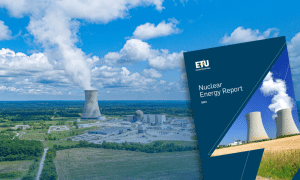It wasn’t all that long ago Facebook and Amazon were heavily criticised for their carbon-intensive operations, but both companies have rapidly transformed from laggards to leaders.
First, to Amazon. The company announced late last week the Amazon Wind Farm Texas project, which will be a 253-megawatt power station in Scurry County, Texas.
The facility will generate 1,000,000 megawatt hours of wind-sourced electricity each year; enough to provide the power needs of close to 90,000 U.S households. More than 100 wind turbines will be constructed at the site, which are expected to be completed and supplying electricity by late next year.
Combined with the company’s other wind and solar farms in Indiana, North Carolina, Ohio and Virginia, Amazon will be generating 2.6 million MWh of cheap, green electricity each year.
The clean energy projects will be powering current and future Amazon Web Services (AWS) Cloud data centers. AWS has committed to achieving 100% renewable energy usage for its global infrastructure footprint.
Over to Facebook now and last Thursday the giant of social networks announced its next data centre, which will be constructed in the village of Los Lunas, New Mexico, will be powered by 100% wind and solar energy.
“By powering our data center with renewable energy versus natural gas, we also reduce the water usage associated with the data center by 30 percent,” said Ken Patchett, Facebook’s Director of Data Center Operations, West Region. “The new solar and wind farms also bring additional jobs and investments to the region.”
Mr. Patchett says the data center will be the one of the most energy-efficient in the world.
Facebook set a goal of reaching 25% renewable energy in 2015 for all data centers; which it met and exceeded. Last year, it set a new target; aiming to have at least 50% clean and renewable energy in its mix in 2018.
Facebook also has a number of related projects including, Aquila – a massive solar powered drone that will be part of a fleet of similar aircraft beaming internet connectivity to people in underserved communities. In July, Aquila successfully completed its first test flight in Yuma, Arizona.

















































